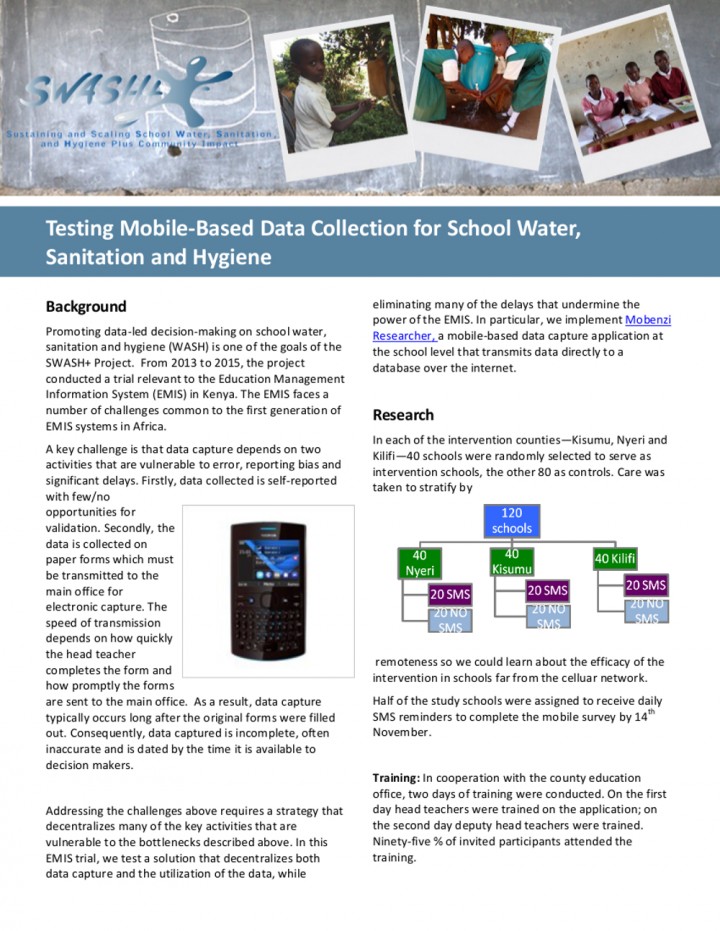SWASH+ Sustaining and scaling school water, sanitation and hygiene plus community impact
Various authors (2015)

Published in: 2015
Publisher:
CARE
Author:
Various authors
Uploaded by:
danijela milosevic
Partner profile:
common upload
5841 Views
147 Downloads
Content - Summary
This library entry contains background documents for a grant that Peter Lochery and Malaika Cheney-Coker are leading and which is funded by the Bill and Melinda Gates Foundation.
Further information is also available on the SuSanA discussion forum, see link below.
Short description of the project:
The overall goal of SWASH+ Phase II is to improve the sustainability and effectiveness of school water, sanitation and hygiene (WASH) at scale in order to support the Government of Kenya’s Comprehensive School Health Policy. The project has the following key objectives:
• Decision-makers have access to and act on high quality data to make investment decisions to provide school WASH services.
• Decision-makers have access to information on school WASH life cycle costs and allocate resources accordingly.
• Decision-makers access learning and take measures to improve school WASH governance, inclusive of accountability and support at all levels.
Like Phase I, phase II is based on an action-research-advocacy approach that seeks to test and promote viable solutions to implementing school WASH services with officials at school, county and national level.
The project consists of a research arm and an advocacy arm.
The research arm of the project is comprised of the following studies:
• Life Cycle Cost Study (completed) – This study entailed a cost analysis conducted in Kisumu, Nyeri and Kilifi counties of what it takes to implement and maintain a school WASH system over a 10-year period. It demarcates costs into capital, operations and maintenance, recurrent, etc, for more efficient budgeting and attention to oft-neglected costs.
• Private Sector Trial (ongoing)– Working with social enterprise eco-latrine organization Sanergy, this study is investigating the outcomes and feasibility of introducing private sector provision and maintenance of eco-latrines in underserved urban primary schools in Nairobi.
• Education Management Information System (EMIS) (ongoing) trial – The EMIS trial has focused on the use of mobile phone-based data collection (in Kisumu, Nyeri and Kilifi counties and at national level) to improve the quality and compliance of reporting from schools, including on WASH data.
• Governance trial (ongoing) – This trial in Kisumu, Nyeri and Kilifi counties is comprised of several arms that experiment with improving communication flows to and from parents, increasing incentives and promoting accountability for providing school WASH services. It features ideas such as using mobile phone-based ratings for services, and promoting WASH messages and support through take-home calendars.
The policy arm of the project has thus far focused on using the results of the life cycle cost study to recommend more and better allocations to decision makers within the Ministry of Education, Science and Technology, including the Budget Task Force. In addition, SWASH+ advocates within the ministry, for the adoption of mobile-based data collection by government.
+++++++++++
Documents available for download below:
1 - Governance trial brief: Boosting incentives, administrative capacity and prioritization related to school WASH
2 - Testing mobile-based data collection for school water, sanitation and hygiene
3 - The life cycle costs of school water, sanitation and hygiene programmes in Kenyan primary schools (Outreach paper No. 1)
Bibliographic information
Various authors (2015). SWASH+ Sustaining and scaling school water, sanitation and hygiene plus community impact. CARE
Filter tags
English Schools Sub-Saharan Africa Sustainable WASH in institutions and gender equality (WG7)















